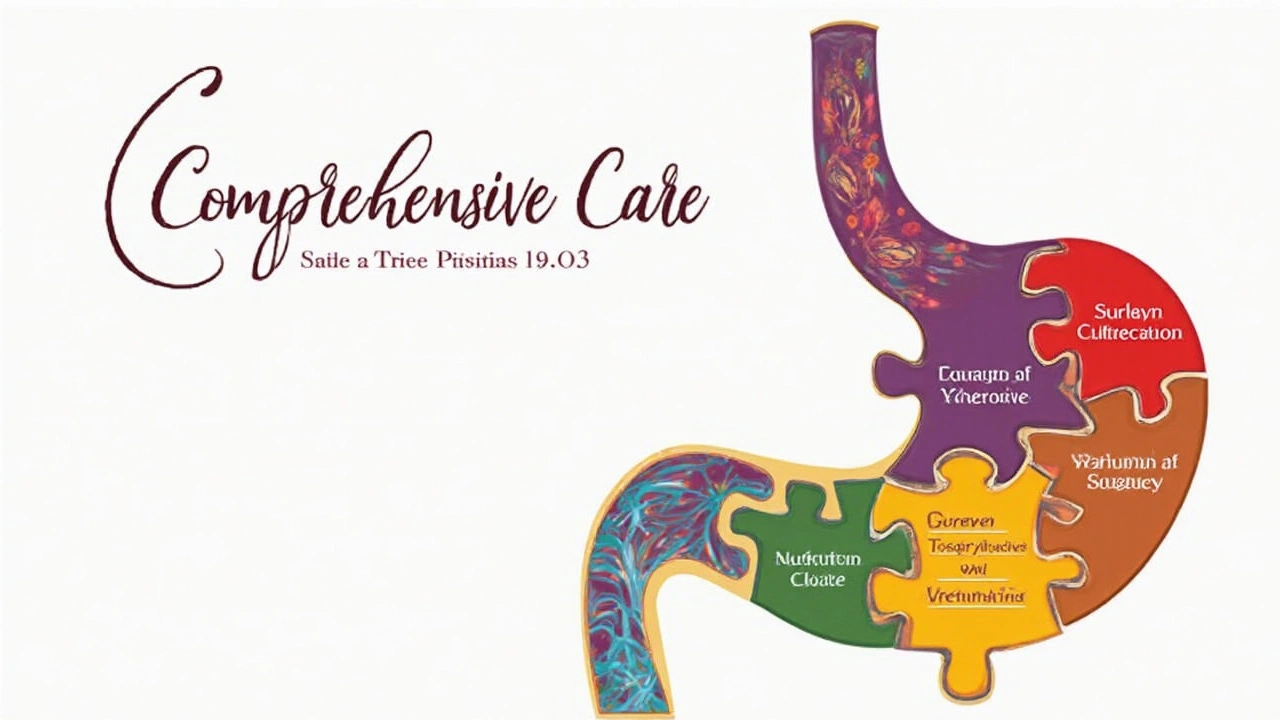So what exactly is Zollinger-Ellison Syndrome? It sounds quite the mouthful, but it’s basically a condition where the stomach goes into overdrive, producing too much acid, thanks to tumors called gastrinomas. These tumors aren’t just pesky; they’re usually found in the pancreas and duodenum, making things a bit complicated.
Here’s the kicker: managing this syndrome isn’t a one-person job. It’s like a puzzle that needs a team to solve it. We’re talking about a group of specialists, each with their own superpower, working together to get the best results. Think surgeons, gastroenterologists, endocrinologists, and so on. Each plays a crucial role.
This team approach isn’t just about sharing the workload. It’s about combining different perspectives, like putting together pieces of a jigsaw to see the full picture. For patients, this means getting a treatment plan that’s not only comprehensive but also tailored just for them.
Why does this matter so much? Well, with a multidisciplinary team on your side, management strategies are more effective, chances of better outcomes increase, and patients can lead a more normal life despite the syndrome. It's a true community effort for the patient’s benefit.
- Understanding Zollinger-Ellison Syndrome
- The Role of a Multidisciplinary Team
- Who Makes Up the Team?
- Why Collaboration Matters
- Real-Life Benefits
- Strategies for Patients and Families
Understanding Zollinger-Ellison Syndrome
Alright, so let’s get to the brass tacks of Zollinger-Ellison Syndrome. It's a rare condition caused by gastrinomas, which are tumors that trigger the stomach to churn out excessive amounts of acid. It sounds unpleasant, right? These tumors usually hang out in the pancreas or duodenum.
Now, what’s tricky with this syndrome is that these tumors can sometimes stay hidden or be pretty sneaky, causing an ulcer-like pain. This means folks might wave it off as just bad heartburn, but all that stomach acid can lead to serious complications.
Symptoms and Diagnosis
Symptoms often start with abdominal pain, diarrhea, and heartburn that meds can't easily fix. The kicker is, not everyone gets all the symptoms, making it a bit of a challenge for doctors to pin down. To diagnose this syndrome, doctors usually get into detective mode, ordering blood tests to check gastrin levels and imaging tests to hunt down those pesky tumors.
Causes and Risk Factors
Most of these cases just pop up out of the blue with no family history. But here’s the twist: around 25% of people have a genetic condition called multiple endocrine neoplasia type 1 (MEN1), which makes them more likely to get it. So having a chat about family medical history might be a good idea if symptoms show up.
Why It Matters
Understanding this condition is crucial because it’s not just about dealing with symptoms; it's about tackling the root cause. Without proper management, it can lead to unnecessary surgery or incorrect treatments, making life more challenging for those affected.
A comprehensive approach that involves various specialists can mean the difference between persistent symptoms and effective relief. That’s why having a good grasp on what Zuillinger-Ellison is all about can set the stage for better management strategies.
The Role of a Multidisciplinary Team
When it comes to managing Zollinger-Ellison Syndrome, a well-rounded crew of specialists is like having a reliable pit crew at a car race. You can't win with just one person turning the wrench; you need everybody working together.
The condition involves more than just the stomach. With potential gastrinomas popping up in tricky places like the pancreas, a multidisciplinary team becomes essential. This team typically includes gastroenterologists, endocrinologists, oncologists, radiologists, and surgeons. Each of these folks brings unique expertise to the table.
The Power of Specialization
Gastroenterologists are the gut detectives, figuring out the extent of acid issues and how best to manage them. Endocrinologists keep an eye on hormone levels, as those pesky tumors can mess with overall body balance.
Radiology and Oncology: A Closer Look
Radiologists play a huge role in spotting these gastrinomas through imaging, while oncologists step in if there's any concern about the tumors being cancerous.
Surgical Interventions
Surgery might be needed to remove these tumors, and that's where skilled surgeons come in. But the decision doesn’t rest with one person; it’s a team consensus, taking into account the patient’s overall health and the tumor’s impact.
By working closely together, the team ensures that patient care is coordinated, gaps are minimized, and no stone is left unturned. This unity translates into more effective management strategies, addressing both the symptoms and underlying causes of Zollinger-Ellison Syndrome.
Who Makes Up the Team?
When you're dealing with Zollinger-Ellison Syndrome, it's like building a dream team. You need a bunch of specialists who know their stuff. Let’s break them down:
Gastroenterologist
These are the gut gurus. They understand the complications caused by excessive acid production and help manage symptoms to improve digestion and comfort.
Endocrinologist
Since this syndrome involves hormones, endocrine specialists are key players. They monitor and manage hormone levels and help handle the insulin-producing cells in the pancreas where those pesky tumors might pop up.
Surgeon
If tumors need removing, you want a top-notch surgeon on hand. They play a critical role in not just removing tumors, but also in explaining surgical options and recovery plans.
Pathologist
These experts are the detectives who analyze tumor samples. They help diagnose the condition and determine whether tumors are benign or malignant.
Nuclear Medicine Specialist
Zollinger-Ellison can require imaging for accurate diagnosis. Nuclear medicine folks handle these techy scans to pinpoint the location and size of tumors.
Nutritional Specialist
With all that acid production, what you eat matters. Nutritionists ensure that patients get diets tailored to their needs to avoid making the symptoms worse.
These specialists don’t just work separately. Communication and collaboration among them are crucial. They discuss treatment options, share insights, and create comprehensive plans for the patient. It’s this coordinated effort that often leads to better patient experiences and outcomes.

Why Collaboration Matters
When it comes to handling Zollinger-Ellison Syndrome, collaboration isn't just a nice-to-have; it’s a necessity. Why? The complexity of the condition means that one perspective simply isn’t enough. Think of it as building a bridge; you need a team of different engineers, not just one, to make sure it stands strong.
Multidisciplinary Insight
In tackling this syndrome, the word 'multidisciplinary' is key. Each specialist brings their unique expertise to the table. The surgeon might focus on removing tumors, while the endocrinologist zeroes in on hormone levels, and the gastroenterologist manages the acid production. Together, they craft a treatment plan that's finely tuned to the patient's needs.
Improved Patient Outcomes
This team approach isn't just for show—it directly enhances patient outcomes. Studies have shown that individuals with Zollinger-Ellison who receive coordinated multidisciplinary care often have fewer complications and better long-term health compared to those who don’t. That’s because team discussions can lead to catching issues before they become problems.
Communication is Key
One of the best things about collaboration is the open communication between the specialists. They regularly share updates, adjusting treatment strategies in real-time based on new findings or patient feedback. This dynamic process ensures that the patient’s care is always optimized.
Efficiency and Support
Beyond health benefits, a collaborative team offers logistical advantages. Patients receive a more streamlined treatment experience, significantly reducing the potential for conflicting advice. Plus, it creates a support network not just for the patient, but also for their loved ones, helping them navigate the emotional and practical challenges of the diagnosis.
In sum, the power of a multidisciplinary team in managing Zollinger-Ellison Syndrome is hard to overstate. It's about pooling expertise, enhancing care efficiency, and making life a bit more manageable for those affected by this complex condition.
Real-Life Benefits
When it comes to Zollinger-Ellison, having a multidisciplinary team offers some pretty straight-up, tangible benefits. We’re talking better handling of symptoms, more precise treatment plans, and overall, a better quality of life for patients.
Quick Diagnosis and Treatment
Imagine this: each specialist brings something unique to the table. When these experts work together, diagnosing the syndrome becomes faster. You're not just relying on a single doctor to connect all the dots. A combined viewpoint often catches things that might be overlooked otherwise. This means starting treatment sooner, and let’s face it, that’s a relief.
Tailored Treatment Plans
But it’s not just about speed. It's also about getting a treatment that suits you best. By having input from various disciplines, the treatment plan is tailored specifically to an individual's needs. Whether it’s the right medication balance or precise surgical options, everything is customized, maximizing the chances of success.
Simpler Navigation in the Medical Maze
Navigating through the complexities of healthcare can feel like trying to solve a Rubik’s Cube. With a team by your side, each member helps guide you through different aspects of the process. This makes the experience less daunting, especially when you’re grappling with something like Zollinger-Ellison Syndrome.
Improved Outcomes
And then there are the outcomes. According to some data, patients managed by a multidisciplinary team often experience fewer complications and a reduction in symptom intensity. It’s a win for patients, as living with reduced symptoms means a significantly improved daily life.
These real-life benefits make having a team-focused approach not just a good idea, but often the best way to tackle this condition. With everyone on the same page, patients get to enjoy life with fewer interruptions from their symptoms.
Strategies for Patients and Families
Living with Zollinger-Ellison Syndrome can be challenging, both for patients and their families. But, don't worry, there are strategies to make day-to-day living more manageable. Here, we'll explore practical tips, healthcare coordination, and support systems that can ease the journey.
Understanding Your Condition
Knowledge is power. Patients and families should take the time to learn about Zollinger-Ellison—what triggers symptoms, how treatments work, and what the healthcare team is doing. Staying informed helps you feel more in control and better prepared to engage with healthcare providers.
Building a Strong Support Network
You're not alone in this. Connect with support groups, either online or locally. Sharing experiences with others who understand can provide emotional comfort and practical advice. Sometimes just knowing someone else has walked the path you're on makes a huge difference.
Coordinating with Your Multidisciplinary Team
Regular communication with your multidisciplinary team is key. Schedule regular meetings to discuss treatment plans and voice any concerns or changes in symptoms. Don’t hesitate to reach out to your team between appointments if new symptoms arise or if you need clarity on treatment.
Embracing Lifestyle Changes
- Dietary adjustments: Avoid foods that tend to irritate the stomach lining, like spicy or acidic foods.
- Stress management: Techniques such as yoga, meditation, or even simple breathing exercises can help manage stress, which might exacerbate symptoms.
Tracking Progress and Symptoms
Keep a journal of symptoms, triggers, and response to treatments. This can be invaluable to your care team and help modify treatments to best fit your needs. It paints a clearer picture of how the syndrome is affecting you personally.
Utilizing Resources
Make the most of resources available, such as patient education materials provided by your doctors, reputable medical websites, and condition-specific organizations. In Canada, resources like the Canadian Digestive Health Foundation can be handy.
| Resource | Contact |
|---|---|
| Canadian Digestive Health Foundation | [email protected] |
| Online Support Groups | various forums |
Remember, while the journey with Zollinger-Ellison Syndrome might not be easy, having strategies and support in place makes it more manageable. Lean on your team, keep communications open, and use resources to stay empowered.


Write a comment